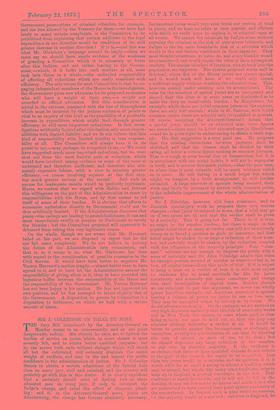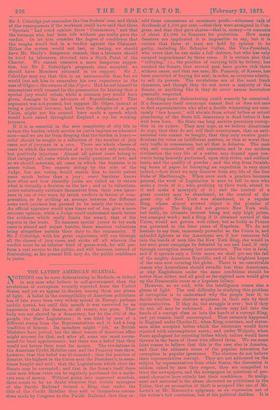SIR J. COLERIDGE ON TRIAL BY JURY.
THE Jury Bill introduced by the Attorney-General on Monday seems to us unnecessarily, and on one point dangerously, radical. His objects, be says, are to lighten the burden of service on juries, which in some classes is most severely felt, and to obtain better qualified jurymen ; but he can secure both ends without changes which will shock all but the cultivated, will seriously diminish the moral weight of verdicts, and may in the end impair the public confidence in the administration of justice. Sir J. Coleridge desires to obtain a certain admixture of the Special Jury class on every jury, civil and criminal, and the country will probably go with him in this desire. It is clearly expedient that a certainty should exist of finding two or three educated men on every jury, if only to interpret the Judge's charge, and resist the effect of eloquent plead- ing ; and if, as the Attorney-General avers, juries are deteriorating, the change has become absolutely necessary.
Incompetent juries would very soon break our system of trial lin pieces, and we have no other at once popular and efficient with which we could hope to replace it, in criminal cases at all events. We cannot try criminals by Judges alone without exposing the criminal to the risk of over-severe tribunals, and Judges to the far more formidable risk of a criticism which would in the end destroy confidence in their capacity. They must blunder sometimes, as juries do, and every blunder would be remembered, and would impair the value of their subsequent , verdicts. The similar blunders of jurymen, who go back into the population, are forgotten. The system proposed works well in Scotland, where five of the fifteen jurors are always special, and it would work well here, if we could only obtain a sufficient supply without crushing the educated class. This, however, cannot under existing acts be accomplished. The rules for the selection of special jurors are so antiquated and absurd, that the class is in some cases so diminished as to make the duty an insufferable burden. In Marylebone, for example, while there are 3,680 common jurors on the register, there are only 300 specials ; while in St. Pancras, with 6,628 common jurors, there are actually only 50 qualified as specials. Of course, accepting the Attorney-General's datum that a special juror should be an educated man, these figures are absurd—there must be 3,000 educated men in Marylebone —and he is quite right in endeavouring to obtain a fresh sup- ply. His first suggestion is a very good one. He proposes that the existing distinctions between jurymen shall be abolished, and that the classes shall be divided by their rating, all below a certain figure ranking as common jurymen. That is a rough or even brutal line of demarcation, but it is in accordance with our social habits, it will not be unpopular in itself, and it secures this much justice,—that the poor man, to whom time is most valuable, will be much seldomer called on to serve. He will belong to a muolt larger list, which might, we imagine, by a little arrangement be still farther extended. A large reservoir of specials being secured, their work may fairly he increased by service with common juries, to the indefinite improvement of the whole administration of justice.
Sir J. Coleridge, however, still fears resistance, and to diminish special-jury work he proposes three very serious changes,—that juries be reduced to seven, that a trial may go on if two jurors are ill, and that the verdict shall be given by a majority. This is going too far. There is, it is true, no magic in the number twelve ; but there is magic in the popular belief that so many as twelve men will not be seriously wrong on so broad a question as guilt or innocence, and that belief might be shaken by so large a reduction of their mine- her, and certainly would be shaken by the reduction coupled with the admission of the majority principle. Four " come mon " opinions are not enough to impress the public with a sense of certainty, and Sir John Coleridge admits this when he exempts persons accused of murder or treason—that is, in fact, all capital cases—from this mode of trial. If it is unjust to hang a man on a verdict of four, it is still more unjust to condemn him to penal servitude for life, for juries notoriously and naturally put more conscience and energy into their investigation of capital cases. Besides, though we are reluctant to put the argument, we never can wholly ignore American example, and American precedent is against leaving a balance of power ou juries to one or two men. They may be corrupted either by bribery or by terror. We do not advocate unanimity. On the contrary, we are assured on very high American authority that the rule of unanimity works evil in New York, the system in cases where guilt is clear being to bribe one man to hold out, so that the jury may separate without delivering a verdict at all. It would be better to provide against the incompetence, or obstinacy, or corruption, or religious particularism of one man, by allowing the vote of eleven, or even of ten, to be final ; but we should deprecate any large reduction of the number, or any vote by absolute majority. If the evidence is so obscure that three or four qualified citizens do not believe in the guilt of the accused, he ought to he acquitted. Less than ten jurors would be a mistake, and we question if it is worth while for so small a saving to affront a tradition which may be absurd, but which, like many other traditions, helps to keep up in England a general confidence in the law. That confidence is nearly invaluable, and it will not be felt in the decision of men too few not to be known and marked, and who are understood to have carried their point against a minority of the unconvinced. In Ireland such a plan would be ruinous, j for the majority would be terrorised ; and even in England, let
Anything more disheartening could scarcely be conceived. If a democracy itself uncorrupt cannot find or does not care to find representatives who after a double winnowing are com- monly " law honest," will abstain from actual bribes or actual plundering of the State till, democracy is dead before it has well been born. No State can long survive pecuniary corrup- tion in its rulers. They may urge, as we believe Americans do urge, that they do not sell their countrymen, that an anti- national vote cannot be bought, that they only receive grati- fications for votes on indifferent matters, or that at worst they only traffic in concessions, but all that is delusive. The men who sell concessions will sell contracts, and in our moderq civilisation the very life of a nation may depend upon con- tracts being honestly performed, upon ship rivets, and soldiers' boots, and the quality of powder ; and the step from furnish- ing boots of paper to betraying an expedition is very short indeed,—how short we may discover from any life of the first Duke of Marlborough. When once such a practice becomes general, the work of Legislation is sure to fall to men who make a trade of it ; who, profiting by their work, attend to it and make a monopoly of it ; and the control of a ante in one of two ways, by lavish verdicts in favour of corn- great country may be abandoned, as the control of the pensation, or by striking an average between the different great city of New York was abandoned, to a regular sums each juryman has guessed to be nearly the true value. Ring, whose almost avowed object is the plunder of An official appraiser would nine times out of ten give a more the people. The Ring did not govern New York well, accurate opinion, while a Judge could understand much better but badly, its ultimate interest being not only high prices, the evidence which really limits the award, that of the experts in the trade. To summon special jurors to try such cases is absurd and unjust besides, these amateur valuations being altogether outside their duty to the community. If Sir J. Coleridge just remember the Gas Stokers' case, and think of the consequences if the workmen could have said that three " Specials " had voted against three " Commoners," and that the foreman who had been left without gas really gave the verdict. Or let him consider the degree of confidence that the roughs would feel in a verdict against the Claimant. Either the system would not last, or lasting, we should have Mr. Hardy's dangerous remark, that a labourer should be tried by labourers, elevated into a Sixth Point of the Charter. We cannot conceive a more dangerous sugges- tion, but Sir J. Coleridge's proposals once accepted, we
should have Members returned in its support. Sir J. Coleridge may say that this is an unreasonable fear, but we would just ask him to remember his own experience in the case of Odger v. the owners of the Figaro. Had he not himself to remonstrate with counsel for the prosecution for hinting that a special jury would refuse, while a common jury would have given, damages to the advocate of Republicanism ? That argument was not pressed, but suppose Mr. Odger, instead of being a political lecturer, had been the delegate of a great Union, might not his counsel have made a speech which would have raised throughout England a cry for working Jurymen. If it is so essential in the new complexity of city life to reduce the burden which service on juries imposes on educated men—and we are far from denying that the burden is heavy— relief should be sought in a reduction of the number of jury cases, not of jurymen in a case. There are whole classes of cases in which the intervention of a jury is not only needless, but positively injurious. Almost all patent cases belong to that category, all cases which are really questions of law, and as we should maintain, all cases in which the business is to assess values. Two experts sitting by the side of the Judge, but not voting, would enable him to decide patent cases much better than a jury ; every barrister knows how often and how absurdly juries are called on to return what is virtually a decision on the law ; and as to valuations, juries notoriously extricate themselves from their own ignor- but scamped work ; and a Ring, if it obtained control of the Union, would not govern well either, but as badly as France was governed in the later years of Napoleon. We do not hesitate to say that, immensely powerful as the Union is, and Sir J. Coleridge, with his great experience, will run through splendid fighters as the Americans are, if her resources fell all the classes of jury cases, and strike off all wherein the into the hands of men like the New York Ring, she would in verdict must be an inferior kind of guess-work, he will per- her next great campaign be defeated by sea and land, if only form a real service to the public, and will increase, instead of through corruption among her contractors. The vice is fatal, diminishing, as his present Bill may do, the public confidence and if it spreads only a little more, we shall yet see the fall



































 Previous page
Previous page